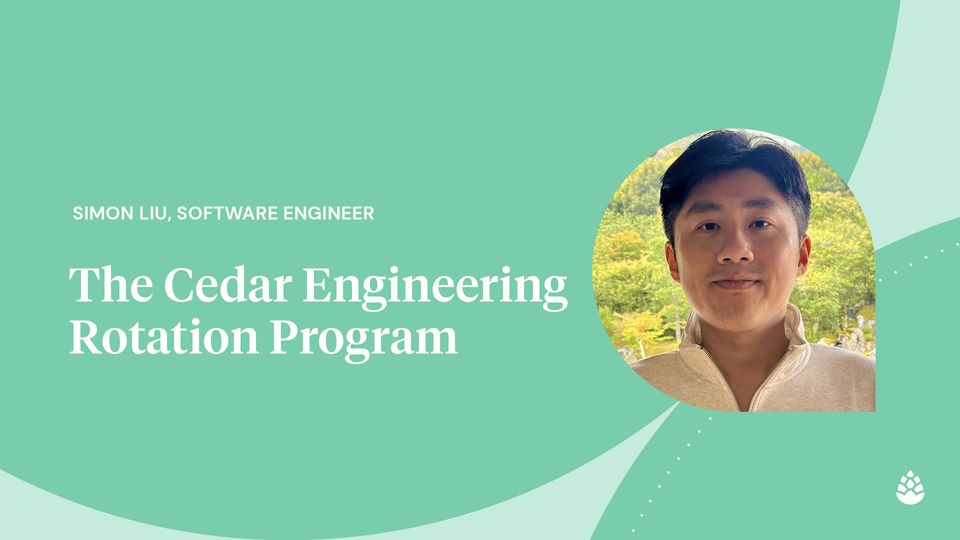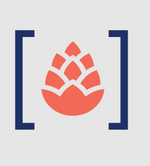Cedar’s engineering organization builds and ships products that deliver value to customers. Earlier this year, we launched an Engineering Rotation Program to enhance the learning experience for our engineers. The program came to fruition when an engineering manager approached another engineering manager from a different team seeking a specific growth opportunity for their team member. Today, the program runs across the organization and has two main objectives:
- To provide Cedar engineers with opportunities to explore new teams
- To bridge the gap between one’s everyday work and the work of their colleagues
We sat down with Cedar’s Simon Liu, Software Engineer 3, a recent graduate from the Engineering Rotation Program. Read on to learn more about Simon’s experiences rotating to the Empower squad, which builds alpha features for our flagship product, and most importantly how this experience has given him a brand new perspective on the entire Engineering org at Cedar.
Before we get started, it would be great if you could tell our readers a little bit more about yourself.
I'm Simon, born and raised in Brooklyn. I joined Cedar in August 2020; before that, I was at Mount Sinai Hospital working as a software engineer for the Lung Cancer screening department. Initially, I planned on becoming a nurse straight out of college, but towards the end of my bachelor’s degree, I took an intro to computer science course as an elective and immediately knew that it was a better fit for me. I still decided to graduate with a health science degree, but I re-enrolled in night classes for computer science while working a variety of day jobs. This was one of the toughest, yet best decisions I've ever made. My health science and computer science degrees both came into play when I joined Cedar!
That’s an incredible story! Thank you for sharing. Let’s dive into the Engineering Rotation Program. What team did you rotate through and what did you work on?
I rotated to the Empower squad, a newly formed squad that builds alpha features for our flagship product, Cedar Pay—normally, I’m on the Cedar Pre Connect squad, building tools focused on cost-reduction for provider front desk staff. The rotation lasted for approximately four months, and I got to work on some really cool projects. A majority of my time was spent building out a module in our Operator Portal called “Segmenter”. This module allows our team to create segments of users which can be used throughout our app.
Furthermore, I played a part in the creation of a Cedar tool, which empowers our team to send individualized emails to patients. We designed a user interface that facilitates the swift customization of email content, the selection of specific patient segments for email distribution and the scheduling of email dispatch times. One notable application of this tool is streamlining the Medicaid enrollment process. Tasks that previously required engineering efforts to develop unique scripts and tailor email templates can now be accomplished by Cedar staff and potentially by provider staff in the future!
In addition, I contributed to the development of a tool at Cedar that enables our team to send personalized emails to patients. We built a UI where we can quickly customize the email content, select the specific segment of patients to receive the email, and schedule the time the email will be sent. One of our first use cases is simplifying Medicaid enrollment. What would've taken engineering time to craft one-off scripts and custom email templates can now be done by staff at Cedar and possibly provider staff in the future!
What was the most challenging part of the rotational program? And what was the most surprising or unexpected thing you learned?
Aside from the obvious challenge of ramping up on an unfamiliar codebase, another aspect that stood out was the team’s approach to sprint ceremonies. I was accustomed to a Scrum-like environment with the Cedar Pre Connect squad, where we plan our work in two-week sprints, ideal for a stable backlog and predictable features.
In contrast, the Empower squad operates using Kanban, which involves continuous planning and is more suitable for dynamic environments where immediate client needs might take precedence over long-term projects. In Empower, we pulled in tickets as needed and had fewer sprint ceremonies, with only daily stand-ups and monthly retrospectives. Assigning points and ticket descriptions were also optional, which was surprising to me. This approach provided a lot of independence and allowed me to gain more experience in taking ownership of projects in a different environment.
In your opinion, why should a Cedarian on the engineering team participate in this program? What value could this bring to their everyday work?
I believe this rotation program offers immense value for personal growth and networking within Cedar. I worked more closely with everyone on the Empower squad, which has made me much more comfortable reaching out to them for help now. I highly recommend taking advantage of this unique learning opportunity that not many engineering organizations offer. The application process was quite straightforward: My manager asked me if I was interested in this opportunity and I said yes. The next thing I knew, I was embedded in another team within just a few weeks!
Lastly, how do you think participating in the rotation impacted your current day to day approach to work/projects?
The relationships I built have been the most significant takeaway of this program. It's now easier for me to reach out for help and share knowledge across different teams. On the more technical side, I've also begun applying architectural patterns and tools from my time on the Empower squad to my current work. For example, I learned that in Segmenter, we used Elasticsearch for partial matching on encrypted fields. I plan to bring this approach into improving the search functionality on our Intake dashboard, which the Connect squad is developing. At the moment, the dashboard's search functionality only performs frontend filtering, requiring us to pull in all records from our database query. Gaining these technical insights has further boosted my confidence in owning projects and becoming a subject matter expert in different parts of our codebase.
To learn more about Simon, connect on LinkedIn
Interested in a career at Cedar? Check out our careers page


